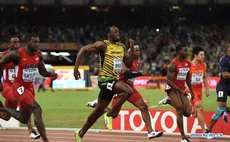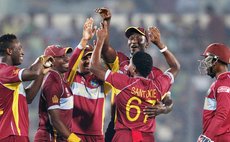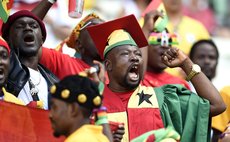Not an impossible dream
Nelson Mandela has been associated with the profound saying that some things seem entirely impossible – until they are achieved. That must have been the feeling in the West Indies cricket team when at the outset England were being tackled for the just concluded series in the Caribbean. Though England arrived here under the adverse effects of embarrassingly poor results in the World Cup, they were known to be of late rather grim fighters when wounded in their pride. Given the type of assurance afforded by the game's longer format, Alistair Cook and his men were odds on favourites to acquit themselves in the three scheduled Tests with greater reliability against opponents who have in the last several years proven so consistently brittle.
This brittleness concretely flared up at Grenada. We lost wickets in droves just when there was need to bat sensibly and, above all, to critically embrace the imperatives of answering the dictates of Test match play. There are those of my fellow armchair critics offended by my censuring of Marlon Samuels for the way he departed from applying himself with renewed determination in the second Test after getting to his century on the second morning in continuation from 94 not out overnight. His capitulation led to a succession of reverses symptomatic of ripe mangoes falling in clusters under disturbance of a gentle breeze.
My opponents say I heartlessly blamed Samuels, scorer of 103 and they argue that there must be far greater culpability to be apportioned to the earlier batsmen whose failure was strenuously under repair by Samuels. In other words, Samuels was unfairly chastised for his absolute valour in contributing a century when others had produced absolutely nothing. In terms of pure cricketing know how it has to be vitally considered there is value to be secured only from the batsmen who settle and show dependability. From this standpoint a side can entitle itself to prosper.
In this context, for instance, Shivnarine Chaderpaul has endured a deplorably poor series. His out of character run of failures required the experience of Samuels to come to the fore to stand in the breach for the fallen Mr. Dependable. We had opportunity to go into the Barbados Test with the series tied, hoping for a win at a venue where West Indies have historically done extremely well.
Anyway, for whatever it was worth in the pre-match propaganda stakes, the new look West Indies team stated it would go into the match endeavouring to draw the series. Optimistic! It meant winning the final match by wresting the advantage from a resurgent England – latterly triumphant by nine wickets after getting much the better of the opening match.
Disadvantage of losing the toss did not discourage Ramdin and his crew, and England were dismissed for 257, highlight of which was Cook's fighting century – only to be thwarted at the close on the first day by, who else, – Marlon Samuels who had him caught off some clever slow bowling.
To match their resolve West Indies needed to come good with the bat, but they folded ever so poorly for 189, a score built precariously around Jermaine Blackwood's 85, showing the extent to which this young man is vested with the type of character the team needs. He managed to hold his own and withstood the menace of the veteran Jimmy Anderson whose swing earned six wickets for 42 runs.
The lead by England only 68, there was still the important task of not only getting the Englishmen out a second time – a feat eluding West Indies ever so often – but necessary on top of this to dismiss them once again and rather cheaply. A crowd of about 10,000, largely containing English supporters among whom a trumpeter kept piping his laments, was duly resigned to the dog fight of a low scoring match.
Regular fall of wickets resulted in England snuffed out for 123 – victims of Jerome Taylor 3 for 33, Jason Holder 3 for 15 and Permaul 3 for 43. The bowlers couldn't have done better. They had put West Indies in line for victory in three days.
How certain was this victory? Only 192 runs were needed, and bearing in mind never before had fewer than 200 runs proved to be an elusive target for West Indies in a fourth innings, it should have been a foregone conclusion, but the realities of a chronic propensity to "snatch defeat from the jaws of victory" lurked as an evil menace.
Fall of the first wicket at 35, newcomer Hope not living up to his name, and Kraigg Brathwaite going for 25 on the same score could have proved more than ominous. However, Samuels and Darren Bravo revealed a determination to show England there was no fear of their bowling and it would not be allowed too strong a psychological bearing.
Samuels fell victim to Broad for only 20, his demise occasioned by an entrenched absence of proper foot movement. Yet, his belligerence had impacted strongly and had set the pattern for Bravo and Balckwood, two youthful players apparently destined to play great part in establishing a West Indies revival on the world stage. Bravo, 82, only missed out with four runs required for the victory and Blackwood dutifully was there at the finish with 47 not out – after Chanderpaul had climaxed his disasterous series with a duck.
Mandela would smile and say "well done at the achievement of the five wicket win by West Indies and the series drawn 1-all. New coach Phil Simmons has not been known to smile much. He certainly wants West Indies to work towards their impossible dream of getting back on top of world cricket. Next assignment at home is a brief series with Australia.




